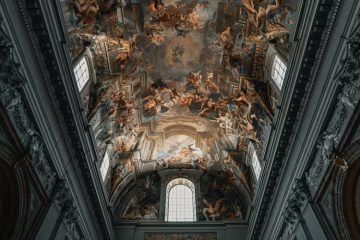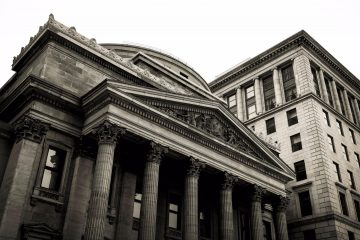By Sophie Rydzewski
All acts of creation are rooted in labor. As humans, our very lives are constellations of creation, from the creation and maintenance of family, to the pursuit of wealth, to the process of art making in exploration of the world surrounding us. Across the landscape of human pursuits, the creation of wealth and the creation of art seem in many ways opposed. The pursuit of wealth has long been understood as having the potential to corrupt and draw mankind away from righteous action; the creation of art, in comparison, has something of an impotent innocence to it, an existence outside the realm of profit and subsistence. These oppositions, however, make these different kinds of creation serve complimentary functions in humankind’s stewardship. Contrasting these two modes of creation central to human subsistence and fulfillment, reveals how these functions are both codependent and central to humankind’s role as steward of the highest form of creation: God’s.
The pursuit of art and the pursuit of wealth, while they may coexist for the professional authors, painters, and dancers of the world, are in many ways distinct. It is their combined pursuit that allows for comprehensive stewardship, motivated by both duty and wonder. The making of art without an eye towards profit (in other words, art for art’s sake) is framed by the joy of creation and the search for personal fulfillment. The creation of wealth, in contrast, provides fulfillment of a different nature. The labor that creates individual wealth and ensures individual security in turn guarantees the continued existence of human society, thereby imbuing wealth creation with a more primal sense of purpose. As described in Genesis 2:15, mankind’s original function in the Garden of Eden was to “cultivate and keep” the land he had been given. In much the same way, our infrastructure, medicine, financial markets, agriculture, technology and all other branches of society integral to our survival and growth are themselves the products of continual human labor, the work of billions of individual stewards, each a tiny cog in the machine of creation. The personal and societal wealth produced in these pursuits is the fuel that drives the engine of advancement. Art is what follows this necessary maintenance; art is the response to creation, the wonder and despair and hope that arises from individual human experience. Work allows us to sustain God’s creation; art allows us to imitate it, to pay homage to it, and to enhance it. Art embroiders the cloth that work preserves and extends. Both creative functions are critical to our role as steward, and both, when motivated by an awe for God’s creation, bring a sense of purpose and fulfillment.
Where both art and wealth hold incredible value in defining the role of humankind in maintaining God’s creation, it is their motivation, rather than their ends, that is central to human stewardship. All forms of labor are means of human expression: manifestations of duty, creative urges, and of purpose. In this way, the means of creation not only enable the ends, but they are themselves incredibly precious. The value of art is determined by so much more than the picture on paper; it is rooted in its creative inputs, in the ideas, time, resources, and the motivations of its creator. It is grounded in the underlying sacrifice of its production. Much in the same way, wealth is an end, but these ends are impotent without their means. Work is an act of creation itself, an act of sustaining humanity, of keeping gears moving and markets active and fields reaped. Art and wealth are both the incredible byproducts, the currency of human stewardship and innovation that drive creation forward. The pursuit of creation only for its product is to deny oneself the value of conscious sacrifice, of the purpose that arises from wonder and duty.
Stewardship through creation is perhaps the singular greatest function humankind serves, and it is not without its challenges. Much as it has the incredible potential to fulfill, so too can it corrupt. This point has been made countless times in scripture (Matthew 25:14-30, Luke 16:1-13); sloth, dishonesty, and the abuse of power by the steward of his master’s wealth is unilaterally condemned. This same arrogance is reflected in humankind’s lack of moral and fiscal responsibility for the gift of creation, the wealth of humankind’s master. In this way, tensions exist in the pursuit of wealth and in artistic expression, tensions that threaten the integrity of stewardship. In the creation of wealth and the creation of art, the former sustains God’s creation, yet it also has the capacity to tear it down; the latter replicates it and reveres it, but also allows us, in small ways, to play god. Pursuit of wealth as a proxy for the pursuit of power, and the creation of new worlds through art as a means of gaining a shadow of godlike ownership and authority both abuse the intention of stewardship and undermine the fulfilling nature of labor. Subversions of stewardship are necessarily unsustainable, as they threaten the integrity of the master’s wealth. Abusive creation promises a limited timeline for the creation of future generations, of the maintenance and growth of God’s creation. Human labor and the stewardship that follows cannot be undertaken irresponsibly; the treasure we guard is too great.
Human duty and wonder have driven us forward generation after generation, developing the gifts entrusted to us and documenting our awe of the universe we inhabit. The creative act is one driven by instinct, by necessity, by hope and by joy, and the complement of wealth creation to the pursuit of artistic expression is fundamental to our identity as human beings. Preservation of God’s creation is not in isolation an expression of awe; the creation of art is impossible without the continued prosperity of God’s creation. This duality between different modes of creation enables the wholeness of stewardship, the integral respect and perseverance that our assignment demands. Humankind is privileged with this weighty task, and as we continue to author the coming chapters of creation, it is with a sense of duty and awe that we are made able to do justice to God’s creation.


0 Comments